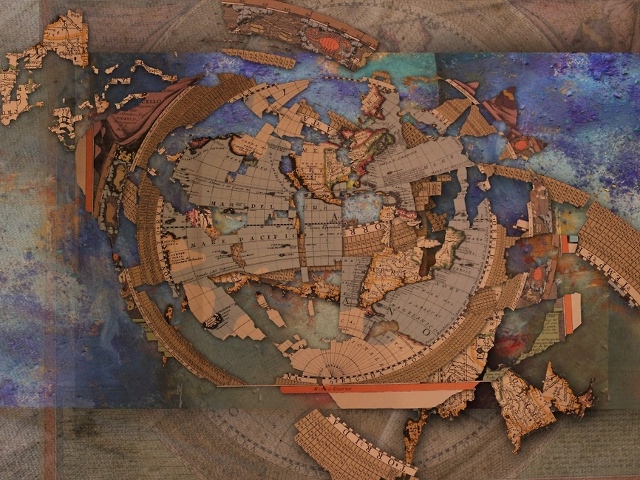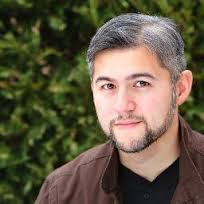An interview with author Phong Nguyen on his latest book, Pages from the Textbook of Alternate History

January 23, 2014
Phong Nguyen is no historian—or so says the author himself of his latest work, which explores alternate histories of well-known historical figures. Indeed, at first glance, Nguyen’s newly published Pages from the Textbook of Alternate History (Queen’s Ferry Press, 2014) might have been born from the wandering daydreams of a high school history student. Yet in pursuing the alternate paths that appeared before historical icons at critical moments in time, Nguyen’s heavily-researched “textbook” challenges the reader’s very conception of history as linear and predictable: Siddhartha remains in his father’s palace to live a life of material excess; Christopher Columbus walks the streets of Shanghai, mocked by local townsmen and traders; Adolf Hitler is accepted into art school and dies a forgotten German painter. Alternately comical, satirical, and moving, Pages from the Textbook of Alternate History chips away at our understanding of history as fixed and unchanging, shining light on the untold possibilities of the past.
Through a series of email exchanges, I had the pleasure to talk with the author about his writing and research processes and the alternate pasts, presents, and futures he envisions for his new book. Read a chapter from the book, “Einstein Saves Hiroshima,” in The Margins.
*
Mark Putterman: For a work of fiction, this book is filled with citations! Could you tell us a bit about the work that went into researching this collection? How were you able to balance your roles as artist and historian?
Phong Nguyen: Well, I should start by saying that I am emphatically not a historian. I did extensive research for the book, but always with an eye towards “what can I turn into a good story?” I am a storywriter, so offering a fulfilling literary experience is my priority from start to finish. I never entertained the fantasy that this would contribute to broad historical understanding, other than to unsettle the fixed (and often false) ideas we have of these particular icons.
As far as the citations go, on the one hand these are quotations, which makes the citations necessary; and on the other hand, the frame of the book is a textbook parody, so it is organic to this project. There are so many quotations in these stories largely because the original language of history (as well as much contemporaneous writing) is frequently quite memorable and literary in its own right, and there were times where I could not see a way to improve upon it.
Could you talk a little more about what the research process looked like? How did it function alongside the actual writing of each story?
Sure. To quote from the research notes I recently wrote for NecessaryFiction.com; I needed to know enough about the historical personage, the era, and the most current understanding of that personage and era, so that the story would have something interesting to say to the historian. But if I got lost in the research, and found myself speaking only to the historian, I risked becoming obscure, arcane, over-specialized. So I settled into a rhythm of reading at least three but no more than five books on the chosen historical figure and his/her era, so that I had a stake in the historical conversation, but not so great of a stake that I became a partisan in it; I needed just enough knowledge to tell a compelling story set in another milieu, and no more—my duty and allegiance being to the art of the story.
I would add to this that the research continued well after the writing was done. That is, in addition to those three to five books I read as background for each story, I would continue to read books on those historical eras and discover anachronisms that would cause me to go back and revise things. That has actually been one of my favorite things about having written the book: I generally have a poor memory, but I will never forget these particular facts because they were hard-won—they were errors, and so they have a context in which I am invested. For example, there was a line in the original draft of “The Great Pyres of Egypt” that said “the Nile moved slower than a camel’s pace.” Long after the story was “finished” in my mind, I read somewhere that camels weren’t introduced to Egypt until a thousand years after Khufu’s reign, so I had to change the line to “the Nile moved slower than a cattle’s pace.” I will never forget, now, that at the time the great pyramids were constructed, there were no camels in Gaza. It is forever imprinted, because of that context.
“Einstein Saves Hiroshima” imagines the failed detonation of the atomic bomb dropped on Hiroshima. I’m struck by the poetics of destruction you weave throughout the story. You’ve also titled an unrelated short story from your previous collection, Memory Sickness, “The Manhattan Project.” What is it about this topic that speaks to you?
“The poetics of destruction” is an apt phrase, but I think it is more a function of the subject—that is, the history of human civilization—more so than of my artistic proclivities. In fact, it was pointed out to me by a good friend and fellow writer Kate Nuernberger that Pages from the Textbook of Alternate History systematically goes about undoing acts of violence: Einstein saves Hiroshima when the bomb doesn’t detonate, after all; Jesus Christ of Nazareth is spared the cross; and Hitler’s death mercifully relieves alternate-history Germany of his destructive chancellorship.
But in the case of the A-bomb, which is referenced throughout Memory Sickness, I’m on the same page with Martin Amis in Einstein’s Monsters when he expresses surprise that we aren’t all thinking about it all the time. The utter horror when confronting the fact that humans have built a weapon capable of the complete self-destruction of life on earth does not, for me, become diluted the longer I contemplate it. Culturally, the shell-shock one feels at the mere possibility of nuclear war is considered passé, oh so cold war; but seventy years is not enough time, in my mind, to move on to another subject.
Given the reality of 21st-century nuclear potential, then, was it cathartic to construct alternate histories that undo these tragedies? For me as a reader, much of the book is liberating in this sense—especially “Hitler Goes to Art School and “Einstein Saves Hiroshima.” And yet, I am haunted throughout by the knowledge that Hitler never did make it to art school; that the A-bomb did detonate over Hiroshima, and so on…. Do you think that fact lends Pages from the Textbook of Alternate History a tragic or tragicomic weight?
It’s extraordinary to me that a reader might feel exactly what I felt in the midst of writing the story, yet that is precisely what you are describing: waves of rising humor and horror in the face of historical absurdity, and an emotional release in the form of an imaginative cartwheel (“catharsis,” with its intimations of bodily purging, doesn’t really get at the fun of the thing).
Apropos of the “thought-experiment” that Einstein undertakes in the story, where a superhuman is traveling at the speed of light, another friend—who I grew up with—said it made him think of the ending of Superman, where the hero flies around the earth at such velocity that he actually reverses its orbit. He suggested that, in writing my own happy endings into history, I was trying to save Lois Lane. I don’t know what to think about this assertion. I don’t outright reject it, but, you know, things don’t end so well for Plato in “Plato, King of Syracuse,” for example, or Toussaint L’Ouverture in “Napolean Invades Louisiana,” or Ben Franklin in “Ben Franklin, Clergyman.” So it’s not all good news. Yet when it comes to the particular stories you mention, I confess to a rush of good feeling as I penned an alternate 20th century in which I imaginatively undid Hitler’s political and global ambition as well as the horrible weapons we devised in our race to contain it.
A lot of scholarly and literary works of late have been concerned with the excavation of “untold” histories—those obscured by the traditional Eurocentric narrative that holds precedence in most Western contexts. How do you see your alternate histories in relation to these excavated histories?
Anybody with a genuine interest in the past—and not just an interest in imposing our personal values on the past as a way of affirming our own greatness—eventually becomes fascinated by the stories that we aren’t being told. I was inspired at a certain age by Howard Zinn and other historians who looked at history from the perspective of oppressed peoples. However, I see Pages from the Textbook of Alternate History as doing very different work from A People’s History of the United States. Both books aim to unsettle the fixed idea we have of History with a capital H—as an infallible monolith that objectively and self-confidently reports the truth—but whereas Zinn is trying to replace the existing confident narrative with a substantial revision to that narrative that is equally confident, I would rather tease out the reader’s curiosity to know more. The button I want to push isn’t populist rage or self-righteous indignation, but fascination with the possibilities of what could-have-been, or what still-could-be. In my experience, the more you research—the more you pursue the elusive historical truth—the more you become aware of what more is out there that is hidden from us. That’s the place I want to lead the reader to: of being overwhelmed by what one truly doesn’t know about these icons of history, but excited by the pursuit of that understanding.
Is this a political endeavor, would you say—to unsettle the reader’s notion of history as fixed and final? To me, the exploration of alternate histories carries with it the opportunity and responsibility to explore alternate futures as well.
I guess? My only hesitation to calling it political is that to say something is “political” assumes taking a mode of proposing solutions, which in turn implies that I have solutions. I don’t, and part of what I discovered while writing the book is how much in-the-dark these leaders and historical icons were themselves. They weren’t prophets; they were men and women. It ought to make one very wary of politics, to think how the quality of leadership requires a certainty in action that is categorically absent from the ranks of the thoughtful. This is an old paradox, one expressed by Yeats in “The Second Coming” in the line “The best lack all conviction, while the worst / Are full of passionate intensity”; and it is the shared theme of two of my favorite books: The Adventures of Huckleberry Finn and Hamlet. Huck, who is more disposed toward doubt, is therefore more morally astute but also necessarily lacks the blind certainty that makes of Tom Sawyer a natural leader. And as Fortinbras points out at the end of Shakespeare’s greatest play, “he was likely, had he been put on, / To have proved most royally.” If only it were possible for a doubter and moral questioner like Prince Hamlet to become king! But thinkers and doubters hesitate, and as a consequence, they get stabbed by poison-tipped rapiers.
You close the book with the epilogue “The Coronation of King George,” which follows the coronation of George W. Bush in 2004 and culminates in the King’s departure from a climate change-ridden earth to colonize Mars. The piece stands out from the rest of the book both because of its proximity to the present and its difference in tone. Why did you choose to close the collection in this way?
It isn’t necessarily George W. Bush. It could be another alternate-history president with the name George. True, George W. Bush wanted to launch manned missions to Mars, but in “The Coronation of King George,” the President actually pilots the ship. So, despite the fact that he shares the same first name, the same blinkered self-confidence, and the same Texas origins, the King of America is subtly but critically different from our 43rd president.
I toyed with other epilogues—so many that I could fill another book with just epilogues. In one of them, the Y2K bug inaugurates a very different 21st century; in another, Rumsfeld’s propaganda project, the Office of Strategic Influence, goes forward; in yet another one, the moon mission goes awry. But the tone was always wrong. I think “The Coronation of King George” fulfills the project of the book largely because the ending calls into question not just the King’s hubris, but all hubris, including my own strongly held biases. Whatever condemnation I might feel for King George and his ilk, I know that, in reality, he is just a man—a flawed and confused human being like the rest of us, grasping for an answer to the unanswerable.
I’m intrigued by your Tumblr entry describing “the fictional fictional” and Pages from the Textbook of Alternate History’s place within its annals. Why is it that you assert that alternate history stories may in fact represent the purest form of fiction writing?
Did I say purest? If I did, I actually meant “most honest,” in the sense that it broadcasts its fictional intent in ways that neither contemporary realism nor postmodern metafiction nor popular genre fiction does. Contemporary realistic fiction derives some of its potency from the extent to which it mirrors the reader—that it reflects our inner lives in some otherwise inaccessible way; it is Picasso’s “lie that tells a truth.” Postmodern metafiction, by self-consciously drawing attention to the artifice of the form, is calling out the manipulations of narrative, but it invariably gives itself a pat on the back for doing so. Genre fiction, when it wants to be serious, often has to work harder to than other more critically favored approaches to justify itself through asserting some kind of symbolic relevance.
Where it concerns alternate history stories, there is just no way that these claims of truth-telling would hold muster, so you are liberated to experience the transportive aspects of story—even in textbook form—without the lure of literary didacticism. It can lead you into expansive, huge territory just like all good fiction, but you don’t have to yield to its directives. That is why Slaughterhouse Five and its time-traveling, history-bending absurdity is one of the greatest American war novels. Think about it: could a writer get away with putting satirical “Suggestions for Class Discussion” at the end of each chapter for any other kind of book?
You’ve shared the “outtakes” of Alternate History online and have mentioned your desire to see others participate in the telling of further alternate histories. What does this collaboration look like going forward?
If I could, I’d like to mention all of the direct collaborations that the book involved first. I collaborated with the artist Sarah Nguyen from start to finish, who designed the cover and all the supplementary images for the audiobook. I collaborated with editor Erin Knowles McKnight on the careful curating and revising of these stories. For the book trailers, I collaborated with animator Mike Rush and filmmaker Daniel Mollenkamp, as well as musicians William Ether and Drew Isleib, courtesy of Ernest Jennings records. And the websites are collaborations with designer An Quigley.
One of the areas where I am seeking wider collaboration is on the annotation website PoetryGenius.com, where I have invited readers to annotate my alternate history stories as a way of teaching actual history—by looking at all the departures from historical record, especially anachronisms, which fascinate me. It is crowd-sourced, like a wiki, so everybody is welcome to annotate the story.
Another collaboration with readers is in the form of a satire-writing contest. In classroom copies of the book, readers will find a sheet of paper explaining the rules of the contest, which is basically to write your own creative responses to the “Suggestions for Class Discussion” at the end of any of the stories. The writers of the ten best satirical pieces will receive an exclusive hand-made book consisting of an alternate epilogue, “The Department of Disinformation,” signed by the author and the bookmaker.
Lastly, wherever I go and conduct readings, I find that the Q&A follow-up quickly becomes a collaboration in which people reveal their own alternate history stories: things they’ve thought about when it comes to world history, and even their imagined personal alternate-histories. Many of these will find their way onto the alternate history Tumblr page, which will eventually become a website in its own right, like a “DVD menu” page with not just outtakes, but behind-the-scenes, making-of, and author commentary woven throughout it.
What gaps are there in Pages from the Textbook of Alternate History that you hope to see filled by collaborators creating new alternate histories?
The book is nothing but gaps! Check out the Tumblr to see me riff on all the missed opportunities for great alternate history stories in real-time. Ideally, this project will lead readers to write their own alternate history stories—ones that I could not even have imagined, and showing me things that I could never have found on my own, either through research or through exploring the well-worn grooves of my own, weird gray matter.





